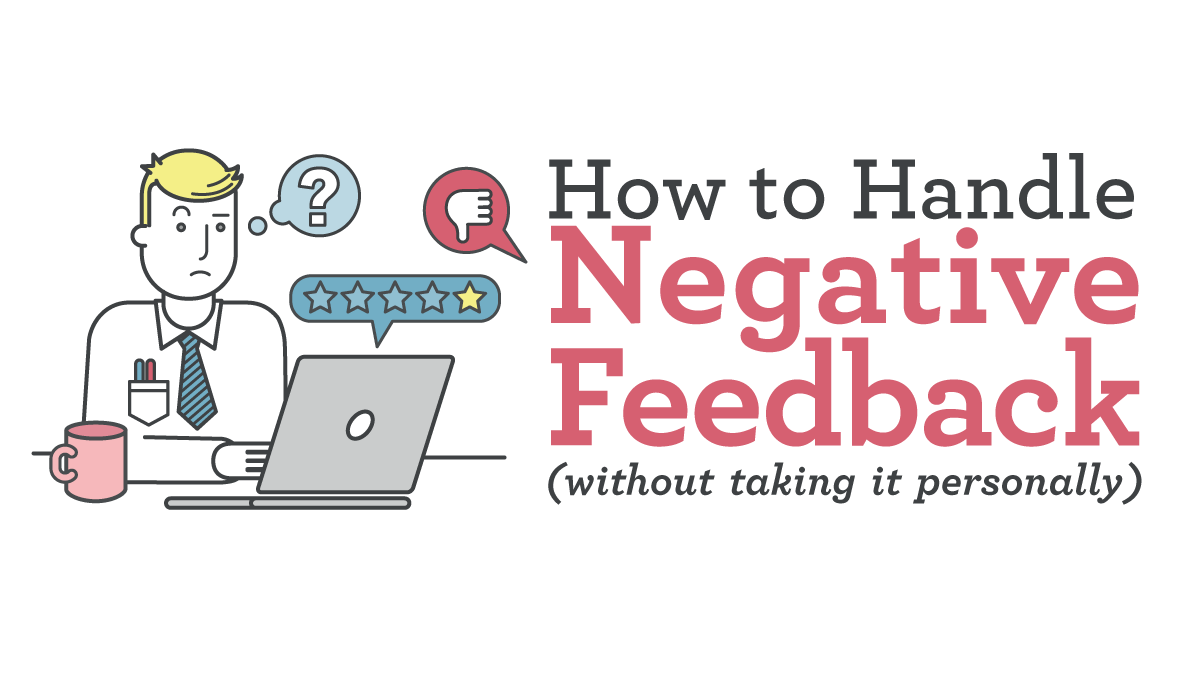Negative feedback is a fact of life: indeed, if you don’t regularly receive it you should worry! When it is constructive, negative feedback helps you to improve at what you do. And taking it well is a great opportunity to demonstrate to your boss that you’re engaged with your work and keen to develop.
But knowing that negative feedback has positive results doesn’t stop it from stinging. It takes calmness and maturity to process criticism like this, but those assets aren’t always easy to access when you’re caught off-guard.
One trick is to slow everything down to give your emotions a chance to settle before you respond. Slow your breathing, keep your body language open and lower your shoulders to relax. Asking questions and repeating back what your critic said can win you more time to think about the feedback and to make sure you understood it correctly.
Hopefully the person who delivers the negative feedback is able to do so constructively, but regardless of their manner always respond with thoughtful thanks and, when appropriate, a genuine apology. The thanks let them know they’ve been heard and get you into the mindset of ‘being helped.’ The apology should be heartfelt. It helps you to think about what you’re actually apologizing for.
Moving on from negative feedback should be a positive experience. If the feedback was accurate, arrange a follow-up meeting so that you demonstrate your will to improve. If you disagreed with the feedback, write it down as closely as you can remember it and read back through it objectively. If you still disagree, talk it over with a trusted friend or colleague to get a third opinion.
Your emotions are useful when responding to negative feedback, but only if you have them under control. We’ve created a new guide on how to handle negative feedback so that you can draw meaning from the connection between what is said and how it makes you feel.
Approached with the right technique, negative feedback can be a springboard to greater things. Are you ready to step up to the challenge?

Sources
- Grote, D. (2015). How to Handle Negative Feedback. Hbr.org
- Edcuba. (2019) 7 Best & Helpful Tips To Manage Negative Feedback Process. Educba.com
- Lerner, H. (2013). Stop Being So Defensive! This 12 Step Program May Save Your Marriage. Psychologytoday.com
- Yackle, K. Schwarz, L. Kam, K. Sorokin, J. Huguenard, J. Feldman, J. Luo, L. Krasnow, M. (2017) Breathing control center neurons that promote arousal in mice. Science.sciencemag.org
- Reiman, Tonya. (2008). The Power of Body Language: How to Succeed in Every Business and Social Encounter. Gallery Books/Simon & Schuster
- Salemi, V. (2017) The good way to respond to a bad performance review. monster.com
- O’Dell, A. (2019). How To Handle Negative Feedback – – Even When It Makes You Want To Cry. Inc.com
- (2009). So you’re not perfect, and you’ve been told so. Nbcnews.com
- Malacoff, J. (2017). What to Do When You Get Negative Feedback at Work. glassdoor.com
- Moy. R. How You’ll Want to Respond to Bad Feedback (and How You Actually Should). Themuse.com
- Lindsay, N. Taking Constructive Criticism Like a Champ. Themuse.com
- Boulter, R. (2018). Making Feedback Actionable. Paradigmshifters.com
- Henry, A. (2013). How Can I Learn To Take Criticism Without Taking It Personally. Lifehacker.com
- Wilding, M. 5 Ways Not to Handle Negative Feedback. themuse.com
- Breuning, L. (2016). How to Train Your Brain to go Positive Instead of Negative. forbes.com
- Frost, A. How to Respond to Negative Feedback in (Almost) Any Possible Scenario. Themuse.com
- Wakeman, C. 4 Steps to Staying Positive After a Bad Review. Themuse.com
Grote, D. (2015). How to Handle Negative Feedback. Hbr.org
Embed This Image On Your Site (copy code below):




